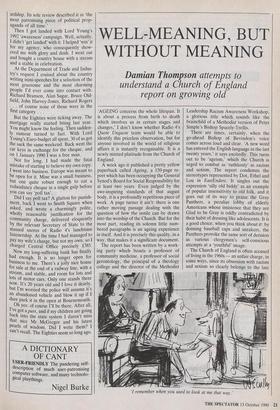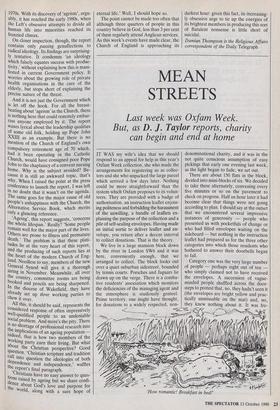WELL-MEANING, BUT WITHOUT MEANING
Damian Thompson attempts to
understand a Church of England report on growing old
'AGEING concerns the whole lifespan. It is about a process from birth to death which involves us in certain stages and changes,' I don't know whether Radio 4's Quote Unquote team would be able to identify this priceless observation, but for anyone involved in the world of religious affairs it is instantly recognisable. It is a newly minted platitude from the Church of England.
A week ago it published a pretty yellow paperback called Ageing, a 150-page re- port which has been occupying the General Synod's Board for Social Responsibility for at least two years. Even judged by the awe-inspiring standards of that august body, it is a profoundly repetitious piece of work. A page turner it ain't: there is one rather moving passage dealing with the question of how the senile can be drawn into the worship of the Church. But for the most part, reading its solemn little num- bered paragraphs is an ageing experience in itself. And it is precisely this quality, in a way, that makes it a significant document.
The report has been written by a work- ing party which boasts a professor of community medicine. a professor of social gerontology, the principal of a theology college and the director of the Methodist Leadership Racism Awareness Workshop, a glorious title which sounds like the brainchild of a Methodist version of Peter Simple's Bishop Spacely-Trellis.
There are times, certainly, when the go-ahead Bishop of Bevindon's voice comes across loud and clear. 'A new word has entered the English language in the last twenty years,' it says excitedly. This turns out to be 'ageism,' which the Church is urged to combat as 'ruthlessly' as racism and sexism. The report condemns the stereotypes represented by Dot, Ethel and Lou in EastEnders. It singles out the expression 'silly old biddy' as an example of popular insensitivity to old folk, and it goes out of its way to praise the Gray Panthers, a peculiar lobby of elderly Americans whose insistence that they are Glad to be Gray is oddly contradicted by their habit of dressing like adolescents. It is a good choice, when you think about it: by donning baseball caps and sneakers, the Panthers provoke the same sort of derision as various clergymen's self-conscious attempts at a 'youthful' image. The Church of England is often accused of living in the 1960s — an unfair charge, in some ways, since its obsession with racism and sexism so clearly belongs to the late 'I remember when you used to look at me that way.' 1970s. With its discovery of 'ageism', argu- ably, it has reached the early 1980s, when the Left's obsessive attempts to divide all human life into minorities reached its frenzied climax.
On closer inspection, though, the report contains only passing genuflections to radical ideology. Its findings are surprising- ly tentative. It condemns 'an ideology which falsely equates success with produc- tivity,' without explaining how this is mani- fested in current Government policy. It worries about the growing role of private health organisations in the care of the elderly, but stops short of explaining the precise nature of the threat.
And it is not just the Government which is let off the hook. For all the breast- beating about 'ageism' in the Church, there is nothing here that could remotely embar- rass anyone employed by it. The report waxes lyrical about the leadership qualities of some old folk, holding up Pope John XXIII as an example. But there is no mention of the Church of England's own compulsory retirement age of 70 which, had it been operating in the Catholic Church, would have consigned poor Pope John to the chaplaincy of a convent nursing home. Why is the subject avoided? Be- cause it is still an awkward topic, that's why- When I raised the point at the press conference to launch the report, I was left in no doubt that it wasn't on the agenda. The same goes for the major cause of old People's unhappiness with the Church, the Alternative Service Book, which merits only a glancing reference. `Ageing', this report suggests, 'concerns the whole lifespan.' Really? 'Some people remain well for the major part of the lives. Others are prone to illness and premature death.' The problem is that these plati- tudes lie at the very heart of this report, and the producing of such reports lies at the heart of the modern Church of Eng- land. Needless to say, members of the new General Synod will give it a thorough airing in November. Meanwhile, all over the country, committee rooms are being booked and pencils are being sharpened. In the diocese of Wakefield, they have already set up three working parties to chew it over.
All this, it should be said, represents the considered response of often impressively well-qualified people to an undeniable social problem. And more's the pity. There is no shortage of professional research into implications mplications of an ageing population indeed, that is how two members of the working party earn their living. But what about the Christian perspective? Good question. 'Christian scripture and tradition call into question the ideologies of both dependence and independence,' waffles the report's final paragraph. Christians have no easy answer to ques- tions raised by ageing but we share confi- dence about God's love and purpose for the world, along with a sure hope of eternal life.' Well, I should hope so.
The point cannot be made too often that although three quarters of people in this country believe in God, less than 3 per cent of them regularly attend Anglican services. As this week's events have made clear, the Church of England is approaching its darkest hour: given this fact, its increasing- ly obsessive urge to tie up the energies of its brightest members in producing this sort of flatulent nonsense is little short of suicidal.
Damian Thompson is the Religious Affairs correspondent of the Daily Telegraph



























































 Previous page
Previous page